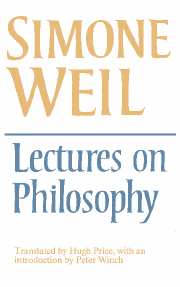4 - Ethics and aesthetics
Published online by Cambridge University Press: 09 December 2009
Summary
‘If the world is divine, all is well;
if the world is given over to chance,
don't allow yourself to go the same way.’
‘Thought, freed from passions, is a fortress.’
(Marcus Aurelius)Morals founded on something other than conscience
Morals based on interest
A. Eudaemonism.
Aristippus, the Cyrenaic, who lived at the same time as Plato, a pupil of Socrates. (N.B. Socrates showed such freedom in his thought that his pupils went in all directions): the good is pleasure. Any kind of pleasure.
Epicurus (fourth century) said: the good is pleasure which has been calculated; that means that it does not run the risk of being followed later by something bad. He distinguished between ‘pleasure which comes from rest’ and ‘pleasure which comes from movement’. The first is nothing but the absence of pain; that means that the soul which is free from pain can find enjoyment in itself.
Pleasure which comes from rest is always pure; it means coming to that state in which the soul delights in its own existence. That amounts to a rule of life which is the same as that of the Stoics. (Cf. Spinoza: ‘Bliss is not the reward of virtue, but virtue itself.’) B. Utilitarianism.
Bentham: the good is the interest of the greatest number.
One can always ask oneself, when dealing with a moral question, how a utilitarian would tackle the question.
- Type
- Chapter
- Information
- Lectures on Philosophy , pp. 165 - 189Publisher: Cambridge University PressPrint publication year: 1978



